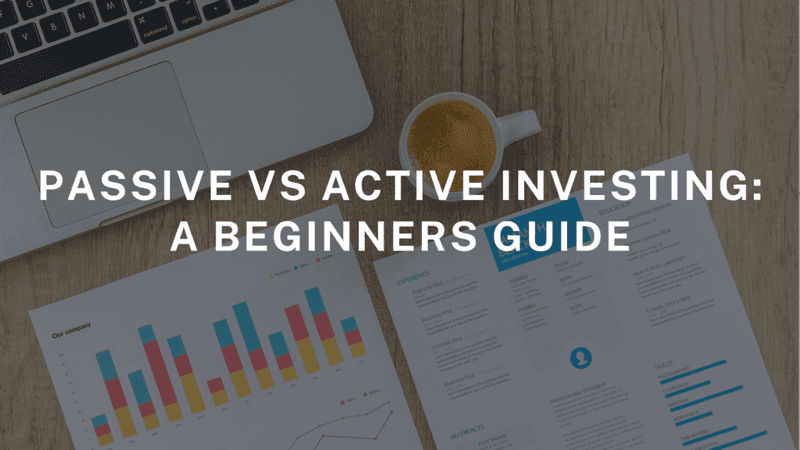Choosing Between Active and Passive Investing: A Comprehensive Guide
With full-time jobs becoming increasingly competitive to secure, salaries getting smaller, and everyday life getting more and more expensive, finding a reliable and effective way to grow your wealth appears to be a more daunting task than everbefore! Figuring out how and where to grow your wealth, is something that can be overwhelming when considering all the different avenues that exist for prospective investors. As a result, BuyProperly will focus this article on distinguishing between two main types of investment strategies — active investing, and passive investing — with the ultimate goal of helping new investors discover what investment approach may best work for them!

Active Investing
Active investing, as its name suggests, requires a more hands-on approach and necessitates that someone act in the role of a portfolio manager. The purpose of active money investment is to beat the stock market’s average returns and take full advantage of short-term price fluctuations. It involves a much deeper analysis, and the expertise to know when to enter into, or out of, a particular stock, bond, or any asset. Forms of active investing include; hedge funds, actively managing stocks to buy and sell, investing in mutual funds that have an investment objective of outperforming a benchmark, as well as most pension funds.
Benefits of active investing:
- Opportunity for investors to quickly take advantage of undervalued market sectors.
- Active investing provides the potential for greater profits and returns than the overall market and index funds.
- Greater control over an investment
Potential disadvantages of active investing:
- Active investing can have much higher management fees and expenses than other investments.
- Can provide more taxable income, leaving you subject to more taxes.
- Can underperform the market due to poor investment strategies.
- Higher risk due to turbulence and volatility of markets
Passive Investing

For passive investors, capital is invested in pursuit of long-term gains. Through passive investing, the amount of buying and selling within one’s portfolio is substantially minimized, making this a very cost and time effective way to invest. This approach requires a buy-and-hold mentality. That means resisting the temptation to react or anticipate the stock market’s every next move. Some examples of possible passive investments are real estate, index funds, dividend stocks, and peer to peer lending (also known as direct lending or crowdfunding).
For example, an innovative and low maintenance way to invest in something like real estate, is through a method known as fractional investing. BuyProperly allows you to share in, and mitigate the risk of, ownership of one or more properties of their choosing that BuyProperly has to offer. Fractional real estate is one of the most easy and accessible ways for investors to diversify their portfolio, but without the hassle that comes with traditional property investment.
Benefits of passive investing:
- Ultra-low fees: Passive funds simply follow the index they use as their benchmark.
- Transparency: Its always clear which assets are in an index fund.
- Tax efficiency: Their buy-and-hold strategy doesn’t typically result in a massive capital gains tax for the year.
Potential disadvantages of passive investing:
- Limited: Passive funds are limited to a specific index or predetermined set of investments with little to no variance; meaning, investors are locked into those holdings, no matter what happens in the market
- Smaller reruns: By definition, passive funds will virtually never beat the market, even during times of turmoil, as their core holdings are locked in to track the market
Which is Right for You? A Mini Quiz!
1. How much time per week do you want to devote to managing your finances
- As minimal as possible
- Just enough to understand the risks and make a decision
- I would be okay with 5 hours a week or more
2. Do you trust your ability to pick stocks?
- No, the stock market is intimidating
- Somewhat
- Absolutely
3. Assume you check on your portfolio and see your account balance has gone down by hundreds of dollars, how would you feel?
- I am instantly tempted to sell
- I freak out a little, but carefully evaluate the situation first
- I don’t panic
4. Do you enjoy reading financial news?
- No, not really
- Sometimes
- Yes! Regularly
*** If you selected “a“ 3 times or more during the quiz, then it sounds like you are more of a hands off, passive investor. If you chose “c” 3 times or more, then odds are you enjoy more active investing type approaches. However, if you found yourself with answers evenly across the spectrum (“a” through “c”), then perhaps a dually inclusive approach of both active and passive investing is the best fit for your money-making pursuits.
Key Takeaways
Ultimately, picking between active and passive investing approaches comes down to outcome expectations and bottom lines. If you are an individual or entity willing to take higher risks in exchange for the chance of high returns, then active investing is most likely the avenue best suited to you.
However, if you are looking for a strategic, dependable, and sustainable way to grow your wealth, passive investment will be best for your situation. With this, there is no worrying about day-to-day portfolio management.
One of the most proven and dependable passive investment approaches is through property ownership, but even more accessible, fractional property ownership. With this, prospective investors can own a fraction of real-estate through a minimum initial contribution, to which their returns would be proportionate to. Check hear to know how to invest in real estate with little money
If you as a prospective investor, are interested in further exploring fractional property ownership as an avenue to grow your wealth, then BuyProperly is the perfect place to get started. For more information on who we are, what we do, and how we can help you expand your investment opportunities, visit our website, follow our socials (Instagram, Twitter, LinkedIn, Facebook), and set up a one-on-one meeting with one of our dedicated team members to address any questions you may have, we are always ready and eager to help!
